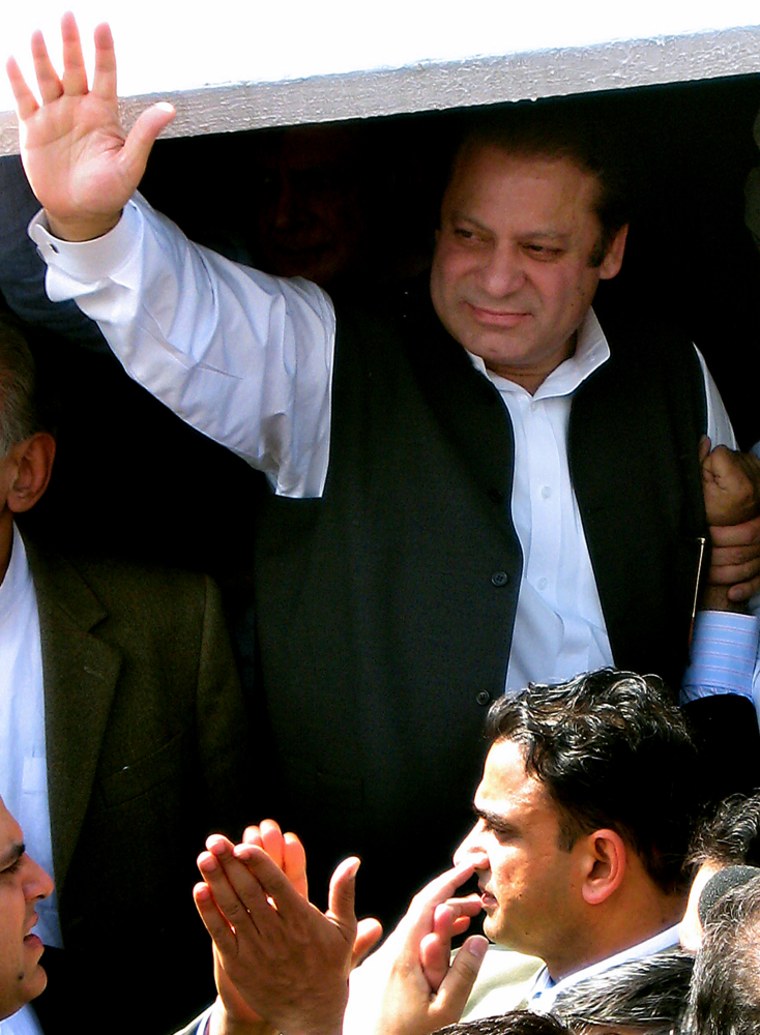Exiled former Prime Minister Nawaz Sharif will return to Pakistan on Sunday from Saudi Arabia, a senior leader of his party told The Associated Press on Saturday, setting up a potential challenge to President Gen. Pervez Musharraf's declaration of emergency rule..
"Nawaz Sharif and other members of his family are coming back to (the eastern Pakistani city of) Lahore on Sunday," said Sadique al-Farooq, a senior leader of Sharif's Pakistan Muslim League-N party.
A close aide to Musharraf said Sharif would not be sent back to Saudi Arabia, although he provided no further details.
"This time he (Sharif) will not be sent back," said Sheikh Rashid Ahmed, a former Cabinet member who remains a close adviser to the general. The former leader was ousted by Musharraf in a 1999 coup, and his past attempt to return led to a quick deportation.
The return of Sharif could bolster the opposition to the president ahead of crucial parliamentary elections on Jan. 8. Sharif, one of Musharraf’s staunchest critics, leads one of the country’s two main opposition parties.
If allowed to enter the country, Sharif would arrive in time to meet a Monday deadline for filing nominating papers for the Jan. 8 vote.
The re-emergence of a heavyweight rival is a headache for Musharraf as he tries to defend his emergency rule against stiff criticism, including from the United States.
The 53-nation Commonwealth comprising Britain and its former colonies suspended Pakistan’s membership because Musharraf failed to meet its Thursday deadline to end the three-week-old state of emergency and quit his dual post as head of the military.
The Commonwealth’s decision is an embarrassment for Musharraf but does not carry any economic sanctions. Pakistan denounced the banishment as “unreasonable and unjustified” and said the body had failed to appreciate its “serious internal crisis.”
The Foreign Ministry said Pakistan was reviewing its ties with the group.
President expected to give up army post
Musharraf, who has allied himself with the United States in battling al-Qaida, is now expected to give up his post as army chief within days in hopes of cooling domestic and foreign criticism of his emergency rule.
Musharraf imposed the emergency just before the previous Supreme Court was to rule on complaints that the constitution bars the army chief from running for elected office.
He suspended the constitution, dismissed independent-minded judges on the Supreme Court and blocked independent TV news. Authorities arrested thousands of lawyers, opposition party supporters and human rights activists.
Musharraf could face a new threat to his authority with the return Sharif from exile in Saudi Arabia, which could potentially shift the political landscape in Pakistan considerably ahead of elections. It could complicate former Prime Minister Benazir Bhutto’s hopes of regaining power. Bhutto, who returned in October, has been favored by the West.
Zafar Ali Shah, vice president of Sharif’s party, said he would be in Pakistan next week.
“There is no doubt about it,” Shah told The Associated Press. “Nawaz Sharif will be with us next week, but at this stage we cannot say exactly when and where he will arrive.”
Sharif's failed attempt
Sharif was swiftly deported to Saudi Arabia when he tried to return in September. That expulsion was supported by Saudi Arabia’s government. But Chaudhry Shujaat Hussain, president of Musharraf’s ruling Pakistan Muslim League-Q party, said Sharif now had “some deal” with Saudi authorities.
“We are ready to face him and he has to face the people” in the elections, Hussain said on Dawn News television.
Musharraf's 'softened' approach
Musharraf has insisted that Sharif stay out of Pakistan until after the vote, which the West hopes will produce a moderate government able to turn the tide against Islamic militants who have gained ground along the border with Afghanistan.
Speculation that Saudi Arabia wanted Sharif to go home had been rife since Musharraf made a surprise trip to Riyadh, the Saudi capital, for talks with King Abdullah on Tuesday.
An official in Musharraf’s office told the AP the general had “softened” his approach toward Sharif.
“The hope is that he (Sharif) will not act like Benazir Bhutto who is following the politics of confrontation,” said the official. “If he agrees to do it, he will be allowed to return home even before the elections.”
The official, who spoke on condition of anonymity because of the sensitive nature of the issue, said associates of Sharif and Musharraf were in touch to explore how they could end their feud.
High court removes barriers to continued rule
Sharif’s plan to return was first announced Thursday, hours after the Supreme Court, now packed with judges loyal to Musharraf, swept away the last legal obstacles to a new five-year term for him as president.
The ruling meant Musharraf could meet another key demand by resigning his military post and governing as a civilian.
The court gave Musharraf until Dec. 1 to step down from his dual role as army chief and take the oath of office as a civilian president, Attorney General Malik Mohammed Qayyum told the AP.
Qayyum has said Musharraf could quit his army post as early as this weekend, although no date has been set. The general has repeatedly pledged to give up his military position by the end of the month.
On Friday, the court also declared Musharraf’s seizure of emergency powers legal.
Pakistan was last kicked out of the Commonwealth in 1999 after Musharraf seized power in a coup, ousting Sharif. It took the country five years to be reinstated.
State-run Pakistan Television read out a message of support for Musharraf from a key ally, his Chinese counterpart Hu Jintao, who said he “completely” understood the president’s efforts to stabilize Pakistan.
